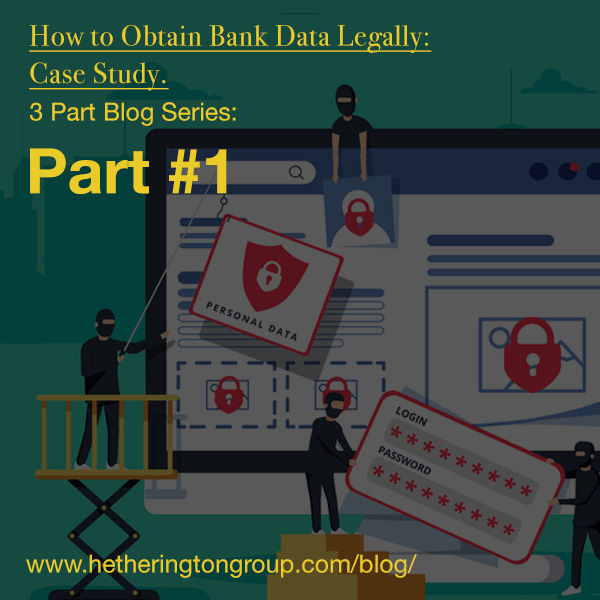By Cynthia Hetherington, MLS, MSM, CFE, CII
 It’s no secret that bank account information isn’t as accessible to legal professionals, credentialed investigators, and asset due diligence researchers as other personal information. If it were merely expensive or inconvenient to obtain this information, professional information aggregators such as LexisNexis and Thomson Reuters would be able to hawk asset databases at their conference vendor booths, and we’d all be lining up in droves to subscribe.
It’s no secret that bank account information isn’t as accessible to legal professionals, credentialed investigators, and asset due diligence researchers as other personal information. If it were merely expensive or inconvenient to obtain this information, professional information aggregators such as LexisNexis and Thomson Reuters would be able to hawk asset databases at their conference vendor booths, and we’d all be lining up in droves to subscribe.
After all, nothing tells a story like someone’s financial information. But at times, it can feel like trying to find a needle in a haystack.
In this 3-part series, we share some old school methods developed by the National Check Fraud Center—including some new techno ideas—for legally obtaining bank account information.
Be Aware of Illegal Loopholes
As investigators, we are governed by foreign and domestic ethics standards and laws. Yet, everyday an investigator, attorney, or accountant appears in the news for crossing the line using the Internet to research, contact, or connect with their target. They find themselves using technology workarounds, finding holes in the system, or outright hacking to gain information—often enough obtaining financial information illegally.
20 years ago, before online banking, an investigator would look into all the banks in a 20-mile radius of the subject and likely locate that subject’s financial institution. Today, however, ubiquitous online banking means your subject can bank with the local community bank or use a virtual banking system without ever entering a brick-and-mortar office. United States laws define legal ways to obtain bank account information. Within the limits of U.S. laws, there are some ways to obtain bank account information.
Use a Subpoena
Most cases that involve locating assets will also involve court matters—fraud, divorce, business separation, etc. An attorney can file a court order requiring the subject to release an accounting of all bank account records.
Shopping Around
If the subject runs a service or has an online or physical business, engage in a commercial transaction. Purchase your item with a check and wait for the statement to arrive at the end of the month to view the bank account number on the back of the check. If the business is online or operates through an online auction site such as eBay, send an email to the owner offering to pay in advance for the product or service and then send your check.
If the subject runs a service group, hire it to perform a service. If you think your subject will not fall for this method, use a third party in your place. Hire another investigator for undercover shopping; tell him or her to make the purchase with a check. If you are hiring your subject for a service—landscaping, manicures, repaving, etc.—make sure your undercover investigator is comfortable with the assignment.
An Hg Case Study:
We were tracking down the never-mentioned bank accounts of a divorcing spouse for a client. He was a local landscaper, so hiring him wasn’t unusual. We hired him to cut the grass on a nearby foreclosed property for $30. He had no idea it wasn’t Hg property. We paid him $30 with a check for the work. When the next bank statement arrived, the subject’s never-mentioned bank account information appeared on the back of our cleared check.
Next Up …
Check back next week, as we continue this series with Uniform Commercial Code Documents and Landlords and Rental Property Records.

Are you an analyst or investigator looking for advanced #OSINT training ? If so, check out Hg’s webinar series, where you can attend live sessions and receive CEUs or watch previously recorded sessions to beef up your investigative skills.

Are you interested in working with an international company but unsure if it’s legitimate? As veteran investigators in global due diligence, Hg understands the business world and the legal and regulatory frameworks in which corporations and privately held companies operate. Our skilled analysts excel at exposing financial risks, reputational issues, criminal activity, and legal actions detrimental to your personal and business stability. Learn how our team can arm you with the data you need.
 Cynthia Hetherington, MLS, MSM, CFE, CII is the founder and president of Hetherington Group, a consulting, publishing, and training firm that leads in due diligence, corporate intelligence, and cyber investigations by keeping pace with the latest security threats and assessments. She has authored three books on how to conduct investigations, is the publisher of the newsletter, Data2know: Internet and Online Intelligence, and annually trains thousands of investigators, security professionals, attorneys, accountants, auditors, military intelligence professionals, and federal, state, and local agencies on best practices in the public and private sectors.
Cynthia Hetherington, MLS, MSM, CFE, CII is the founder and president of Hetherington Group, a consulting, publishing, and training firm that leads in due diligence, corporate intelligence, and cyber investigations by keeping pace with the latest security threats and assessments. She has authored three books on how to conduct investigations, is the publisher of the newsletter, Data2know: Internet and Online Intelligence, and annually trains thousands of investigators, security professionals, attorneys, accountants, auditors, military intelligence professionals, and federal, state, and local agencies on best practices in the public and private sectors.



